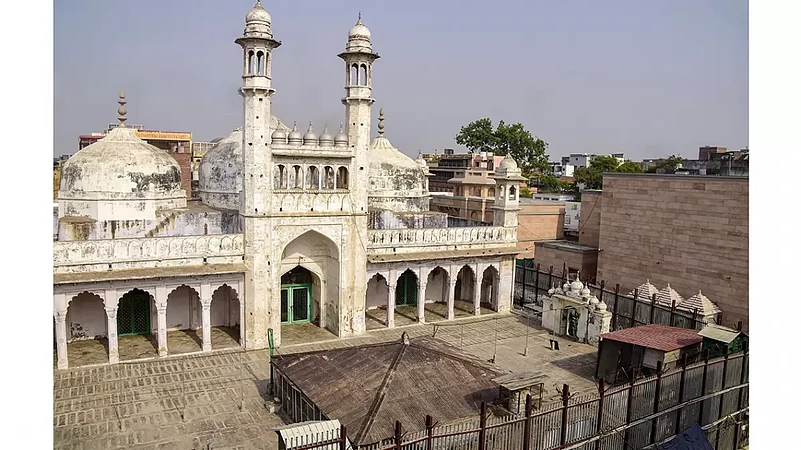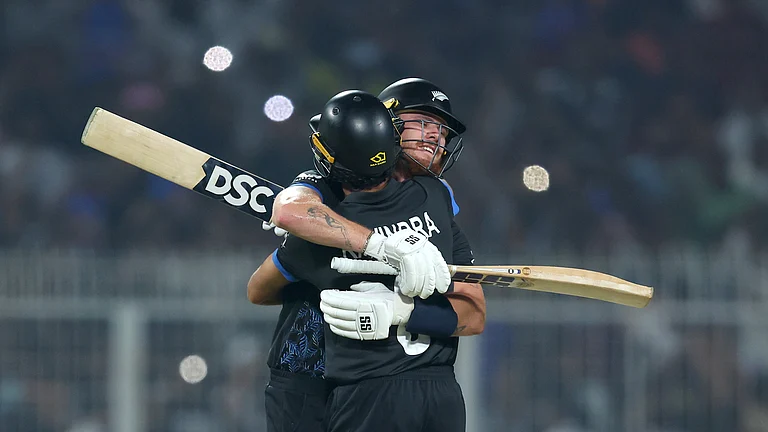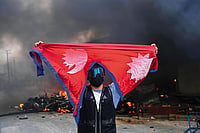The Supreme Court on Friday extended till further orders the protection of the area where a 'Shivling' was stated to be found at the Gyanvapi-Shringar Gauri complex premises in Varanasi.
A bench of Chief Justice DY Chandrachud and justices Surya Kant and PS Narasimha allowed the Hindu parties to move an application before the Varanasi district judge for consolidation of all the lawsuit filed on the Gyanvapi row. It also directed the Hindu parties to file their replies within three weeks on the appeal filed by the management committee of the Anjuman Intezamia Masjid challenging the Allahabad High Court order on the appointment of a survey commissioner.
Here's a timeline of the Gyanvapi case form the time the first petition was filed in 1991:
In 1991, the first petition in the case was filed in Varanasi court by Swayambhu Jyotirlinga Bhagwan Vishweshwar. The petitioner had sought permission to worship in Gyanvapi complex.
He had placed three demands before the court including that the court should declare the entire Gyanvapi complex as a part of the Kashi temple.
Besides, he also sought eviction of Muslims from the complex area and also sought mosque in the complex to be demolished. The petitioner had also pleaded before the court that Hindus should be given permission to rebuild the temple.
In 1998, Anjuman Intezamia Masjid Committee filed a case at the Allahabad High Court. The committee in their plea before the court asserted that the temple-mosque land dispute could not be adjudicated by a civil court as it was barred by the law. It was on the directions of the high court that the proceedings in the lower court got stayed which continued for the past 22 years.
In 2019, a person named Rastogi filed a plea on behalf of Swayambhu Jyotirlinga Bhagwan Vishweshwar in Varanasi district court. The petitioner demanded that an archaeological survey of the entire Gyanvapi mosque complex should be carried out. In his plea, the petitioner mentioned himself as the "next friend" of Swayambhu Jyotirlinga Bhagwan Vishweshwar.
In 2020, Anjuman Intezamia Masjid Committee opposed the petition seeking ASI survey of the entire Gyanvapi complex. In the same year, the petitioner again approached the lower court with a petition, requesting to resume the hearing as the Allahabad High Court had not extended the stay further.
Recent proceedings
Now, the court is hearing a petition by five Hindu women seeking daily prayers before the idols on the mosque's outer wall. Following the survey and the reported finding of a shivling inside the complex, the court had ordered ordered the spot in the complex to be sealed.
The court-appointed commission that surveyed the mosque complex submitted its report on May 19.
Vishnu Shankar Jain, the counsel for the Hindu side, told reporters in May that the court has categorically stated that the report on the videography survey of the complex will be made available to all the parties, but only the court will tell the conditions for this.
Earlier, the Supreme Court on May 20 transferred the civil suit filed by Hindu devotees on Gyanvapi mosque from civil judge (senior division) to district judge of Varanasi, citing complexities and sensitivity of the case and saying it is better for a senior judicial officer to handle it.
The apex court directed the district judge to first decide the application under Order 7 Rule 11 of CPC on maintainability filed by the Mosque committee saying the civil suit is barred by a law of Parliament.
The apex court said that its earlier interim order of May 17 directing protection of the area where "shivling" is said to be found and allowing Muslims to offer namaz in mosque premises shall remain in operation till the maintainability of the suit is decided by the district judge and thereafter for eight weeks to allow the aggrieved parties to approach the higher court.
The bench also directed the district magistrate to make adequate arrangements for "wazu" (ablution) for the Muslims coming for offering namaz in the mosque in consultation with the parties involved in the dispute.
On May 19, Special Advocate Commissioner Vishal Singh submitted the report of the survey work carried out on May 14-16 in the court of the District Civil Judge Ravi Kumar Diwakar, said advocate Madan Mohan Yadav, who is representing the Hindu side in the case. He added that Ajay Mishra, who was removed by the court as the advocate commissioner, had also filed a report on the survey conducted by him on May 6-7.
Earlier, a Varanasi court on May 16 ordered the spot in the Gyanvapi complex to be sealed where a "shivling" was reportedly found during the videography and survey of the complex.
The Hindu side, earlier claimed that the survey team found shivling in the complex near "wazookhana" — a place inside a mosque where people wash hands before offering namaaz.
However, the Muslim side has maintained that the object was part of the water fountain mechanism at the 'wazookhana' reservoir where devotees carry out ablutions before offering namaz.
The Supreme Court transferred the case from the civil judge (senior division) to the district judge on May 20, saying looking at the "complexities" and "sensitivity" of the issue, it is better if a senior judicial officer with an experience of over 25-30 years handles the case.
District judge A K Vishwesh is hearing another case demanding a survey of closed underground places in Gyanvapi premises. This case will be heard on November 11.
(With PTI inputs)





















